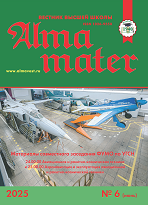UDC 37.01::614
https://doi.org/10.20339/AM.09-20.064
E.M. Rebko is Cand.Sci. (Pedagogy), Ass. prof. e-mail: elvira_rebko@mail.ru; and Yu.S. Gordo is Master student e-mail: Mirawka97@mail.ru at Herzen State Pedagogical University of Russia
Presented are results of an experimental study on formation of tolerance among future teachers in the field of life safety in the period from 2016–2020. Correlation of types of security and types of tolerance is carried out to determine subject-specific component of bachelor’s education. The stages of the formation of the tolerance of future teachers in the field of life safety are described, i.e. motivational value-based, cognitive, activity oriented, practice oriented from the perspective of obtaining basic knowledge, skills, subject of tolerance, it’s relationship with subject-specific disciplines (modules) and training practices. Results of measuring the level of tolerance of students at the end of each stage by means of are presented, i.e. express questionnaire “Level of interpersonal communication”, questionnaire “Tolerance Index”, copyright cases, methodological professional tasks. Also given is the change in the level of tolerance in the process of passing each stage during training for four years.
Key words: tolerance, stages of tolerance formation, tolerance level, educational process, life safety, personality of a safe type of behavior.
References
- Baeva, L.V. Tolerance: idea, images, personnel. Astrakhan, 2009.
- Boyarov, E.N., Stankevich, P.V., Abramova, S.V. Features of the use of modular educational technology in the construction of an asynchronous educational route for the preparation of bachelors in a safe information educational environment. Bulletin of Herzen State Pedagogical University. 2018. No. 190. P. 108–116.
- Vereschagina, N.O., Popova, R.I., Stankevich, P.V. Features of the organization of teacher education in the field of life safety (level of education — undergraduate). Bulletin of Herzen State Pedagogical University. 2019. No. 194. P. 156–162.
- Gubanov, V.M. Philosophy of countering extremism in the activities of educational institutions. In: Ways to harmonize interethnic relations and the prevention of extremist manifestations among youth. St. Petersburg, 2016. P. 83–90.
- Zinchenko, Yu.P. (2011) Tolerance as a factor in countering xenophobia: managing the risk of xenophobia in a risk society. Moscow, 2011.
- Kiseleva, E.M. Methodological aspects of extracurricular activities in the patriotic education of schoolchildren in life safety training. Trends in development of science and education. 2018. No. 39-1. P. 19–23.
- Kislyakov, P.A. Formation of tolerance and prevention of ideology of extremism in the youth environment. Modern studies of social problems. 2011. No. 3. P. 38–45.
- Krepsha, N.V. (2014) Life safety: a textbook for foreign students. Tomsk, 2014.
- Mikhailov, L.A. (2012) Life safety. Moscow, 2012.
- Pivovarov, D.V. Tolerance and non-violence. Psychological Bulletin of the Ural Federal University. 2013. No. 10. P. 129.
- Fomina, M.F. Stages of formation of tolerance of cadets in educational system of university of the Ministry of Internal Affairs of Russia. Historical and socio-educational thought. 2011. No. 4. P. 97–101.











.png)






